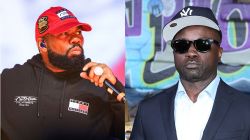Byron Allen’s Entertainment Studios filed a $20 billion racial discrimination lawsuit against Comcast in 2015, claiming Comcast didn’t allow Allen to have his channels carried by Comcast. Although the initial claim was dismissed by the lower court three separate times, the 9th Circuit court of appeals agreed to allow the case to be presented last year.
On November 13, the Supreme Court convened to consider what the legal threshold is for a plaintiff to bring a racial discrimination complaint under section 1981 of the Civil Rights Act of 1866. That law was put in place after the abolition of slavery to ensure “non-whites” were able to conduct business without facing discrimination.
During court proceedings, Diddy and his company REVOLT were brought up as an example of a black-owned business being carried by Comcast. The Hip Hop mogul was displeased to say the least.
On Thursday (November 21), Diddy released an official statement via social media.
“My name and my network, REVOLT, have been mentioned recently by Comcast in reference to the Comcast/Byron Allen US Supreme Court case as an example of Comcast’s inclusive practices with respect to African American owned cable networks,” he wrote. “While it is true that we are in business with Comcast, it is not accurate to use my name or my network as an example of inclusion. I do not want my name to be used inaccurately so I must speak my truth.”
Diddy continued, “I also want to make clear that this case is now about much more than cable distribution. It’s about the civil rights of millions of African Americans and other minorities.
“First, it’s important that people really understand what’s at stake. In its efforts to get the lawsuit filed by Byron Allen dismissed, Comcast has taken a legal approach that could weaken fundamental civil rights protections. I have a problem with this.”
“Comcast is arguing that this law only applies if racial discrimination is the only factor that leads to a refusal to do business, which would be extremely hard to prove,” he added. “If they are successful, it will become much harder for any victim of discrimination to seek justice in court.
“By taking this stance in the Supreme Court, Comcast has put its legal tactics ahead of the rights of millions of Americans to be heard. This is not OK.”
According to REVOLT, court documents state Allen’s legal team argued Comcast refused to carry Allen’s channels and instead chose to carry “lesser-known, white-owned” networks such as FitTV and the Outdoor Channel despite having the bandwidth to carry more.
But Comcast refuted those claims and said their decision was based on business factors — not race. Comcast then used REVOLT TV as an example of inclusion.
However, REVOLT denies they are a “good example of inclusion.”
“In 2013, the REVOLT TV cable channel was given distribution by Comcast as a part of a US government mandate when Comcast bought NBC Universal,” the article states. “This made it possible for the channel even to exist.
“But REVOLT was never put in the most affordable packages on Comcast and has never been given any more distribution than what they got at the time Comcast launched the network as a part of that government mandate. REVOLT isn’t even carried by Comcast in many key African American markets like Philadelphia, Indianapolis, parts of Florida, and the entire states of New Jersey, Alabama, & South Carolina.”
Comcast essentially wants the Supreme Court to rule that under the Civil Rights Act of 1866, Byron must prove racial discrimination is the “sole cause” for it rejecting his channels. Diddy, however, wants no part of it.








Discrimination is natural. I shouldn’t be forced to do business w someone just because their skin color is different than mine. It’s my business and if I want to run it in a racist way who are you to tell me how to live my life
Who cares about Dick swallowing Diddy and his Homo ways…. Stop publishing anything about him unless it’s about him finally dying of AIDs. Fuck him for all the people he wronged in the industry
STFU…..this case impacts the majority of this website’s traffic dickhead
Don’t mind Tommy Strawn, he’s one of Diddy’s bottom boys.
You’re ignorant
And you suck dick. So what’s your point.
How tf you call out a company you been doing business with the last 5-10 Years. Why doesn’t anybody investigate this clown. He the one profited from biggie death, dates high school aged kids (compared to his age) . He’s just a billion dollar clown to me. Never does anything just talks and yells black excellence
Diddy is very attractive for an older man. I’d smash 🙂
What the hell is up with everyone saying “my truth” now? Bitch, there’s your opinion and then the facts. There is no “my truth” it’s just some bs made up to continue to bend the rules for certain idiots.
Where was his truth when he took Biggie to LA for a month? Where was his truth when he screamed when he was pleading for peace from pac and suge only to diss them after pac died and suge went to jail? Where was his truth when he claimed to be a positive black man only to break a bottle on steve stoutes head? When youve been a lying snake all your life, you cant claim to have truth!